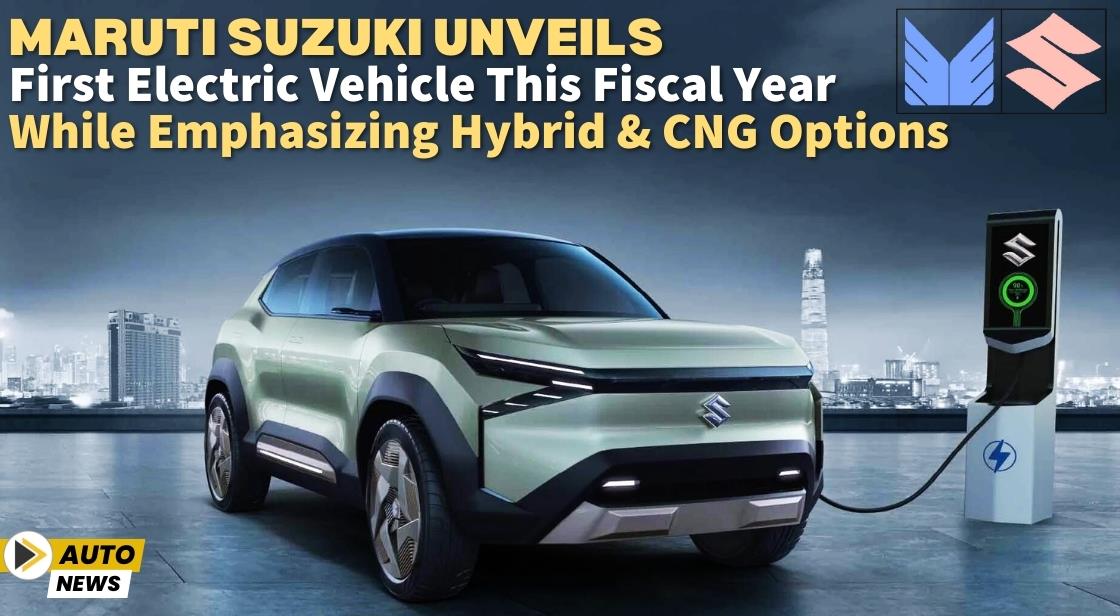Maruti Suzuki Unveils First Electric Vehicle This Fiscal Year While Emphasizing Hybrid and CNG Options

Podcast
News Synopsis
India’s largest car manufacturer, Maruti Suzuki, is set to introduce its first electric vehicle (EV) within the current financial year. This significant move aligns with the company’s commitment to expanding its eco-friendly vehicle offerings. Maruti Suzuki’s announcement marks a pivotal step in its strategy to address environmental concerns while catering to diverse consumer needs.
Emphasis on Eco-Friendly Technologies
In addition to its forthcoming EV, Maruti Suzuki will continue to promote a range of eco-friendly technologies. These include strong hybrid systems, biogas, flex fuel, and compressed natural gas (CNG).
The company’s focus on these technologies aims to reduce emissions and enhance fuel efficiency. According to Chairman R. C. Bhargava, a comprehensive policy framework is crucial to accelerate the adoption of these alternative technologies, which could help lessen the reliance on traditional petrol and diesel vehicles.
Diverse Technological Offerings
Bhargava advocates for a strategy that involves offering vehicles with various technologies at different price points. This approach is deemed optimal given India's resource constraints and economic conditions. While electric cars are set to play a significant role in the future, Bhargava emphasizes the importance of considering strong hybrid technology, CNG, ethanol, and biogas options.
Strong hybrid vehicles are reported to reduce fuel consumption by 35-45 percent, while biogas, being renewable and carbon-negative, offers substantial environmental advantages.
Industry Debate on Hybrid Benefits
The automotive industry in India is currently divided on the issue of extending benefits to hybrid vehicles. Maruti Suzuki and Toyota support the idea of rationalizing taxes on hybrids to foster a transition towards electric vehicles.
Conversely, manufacturers such as Tata Motors and Mahindra & Mahindra argue that such benefits might delay the widespread adoption of fully electric vehicles. Presently, India imposes a 5 percent GST on EVs compared to a 28 percent GST (plus cess) on hybrids. Some state governments also provide incentives for EVs, including waivers on registration fees.
Addressing Criticisms and Strategic Approach
Bhargava has responded to criticisms regarding Maruti Suzuki’s perceived slow pace in electric vehicle manufacturing. He clarified that the company has adopted a diversified approach to align with national objectives.
According to Bhargava, rapid EV adoption depends on reducing costs and enhancing charging infrastructure, which can be achieved through local production and technological advancements.
Balancing Production Strategies
Maruti Suzuki plans to balance its production strategy by offering both high-cost SUVs and affordable small cars. Despite a decline in small car sales due to rising acquisition costs and a trend towards feature-rich SUVs, the company remains committed to producing low-cost small cars. This commitment is essential for attracting first-time buyers and sustaining market growth.
Focus on Low Car Ownership Rate
Maruti Suzuki’s Managing Director, Hisashi Takeuchi, highlighted the low car ownership rate in India, with only 3% of the population owning cars. Takeuchi views India’s goal of becoming a developed nation by 2047 as a significant growth opportunity. He expressed a personal mission to extend the "joy of mobility" to more Indians, reflecting the company's vision of contributing to the nation’s development.
Future Plans and Expansion
In the fiscal year 2023-24, India’s passenger vehicle market achieved a record high, becoming the third-largest globally. Maruti Suzuki’s strategic plans include launching its first EV later this fiscal year and expanding its EV lineup to half a dozen models by FY31.
The company is also exploring biogas production from agricultural, animal, and human waste. Maruti Suzuki seeks supportive government policies to accelerate this development, demonstrating its commitment to both innovation and sustainability.
By pursuing these strategies, Maruti Suzuki aims to address both immediate market needs and long-term environmental goals, positioning itself as a leader in the evolving automotive landscape.
Conclusion,
Maruti Suzuki’s forthcoming introduction of its first electric vehicle underscores its dedication to advancing eco-friendly automotive solutions. By integrating various technologies such as strong hybrids, biogas, and CNG, the company aims to reduce emissions and fuel consumption while catering to diverse consumer needs. Chairman R. C. Bhargava’s call for a supportive policy framework highlights the importance of accelerating the adoption of these alternatives. Despite industry debates over hybrid benefits, Maruti Suzuki remains committed to balancing its production with both high-cost SUVs and affordable small cars to sustain market growth. Managing Director Hisashi Takeuchi’s focus on India’s low car ownership rate reflects the company’s broader vision for expanding mobility across the nation. With plans to launch additional EV models and explore biogas production, Maruti Suzuki is positioning itself as a leader in the transition towards a more sustainable automotive future.





